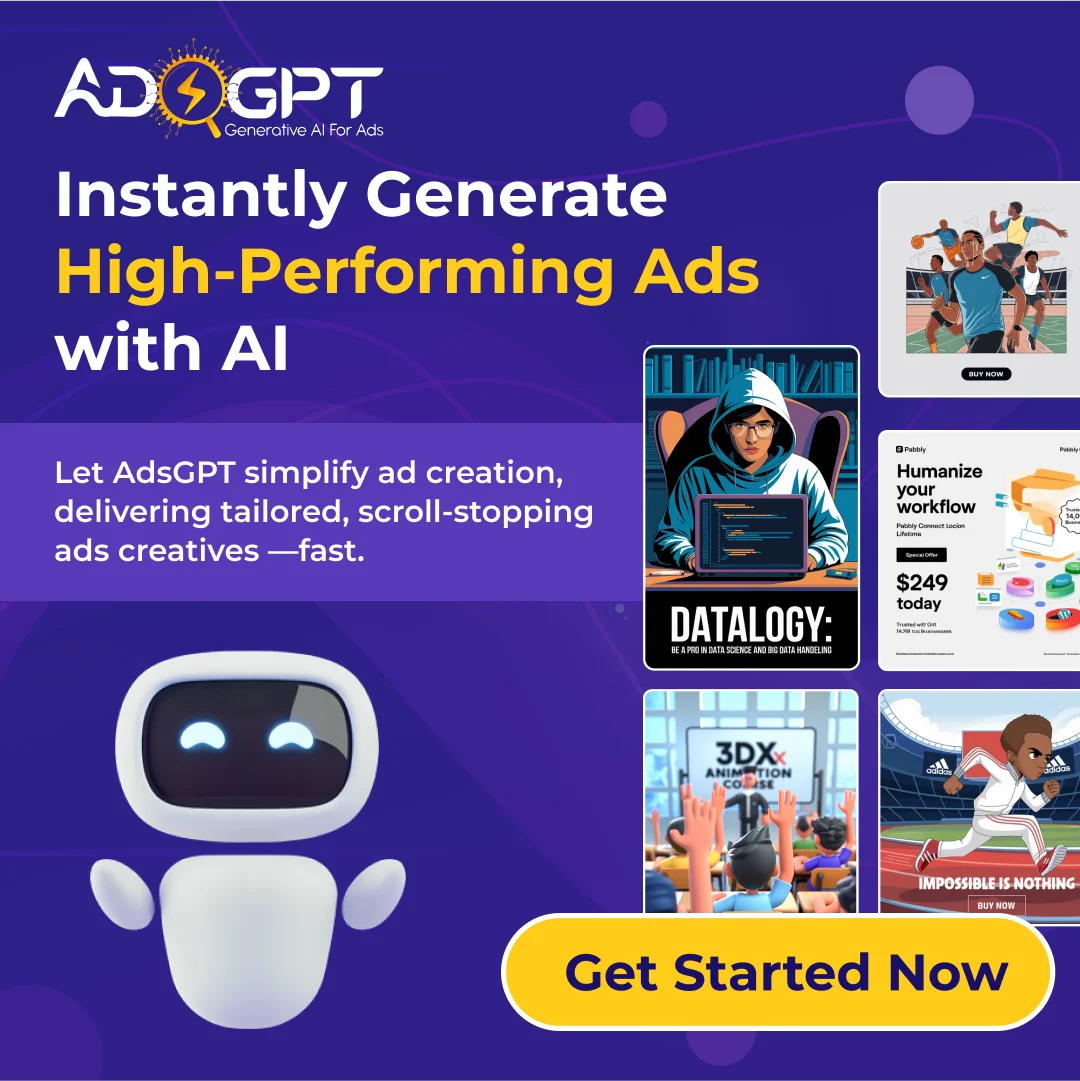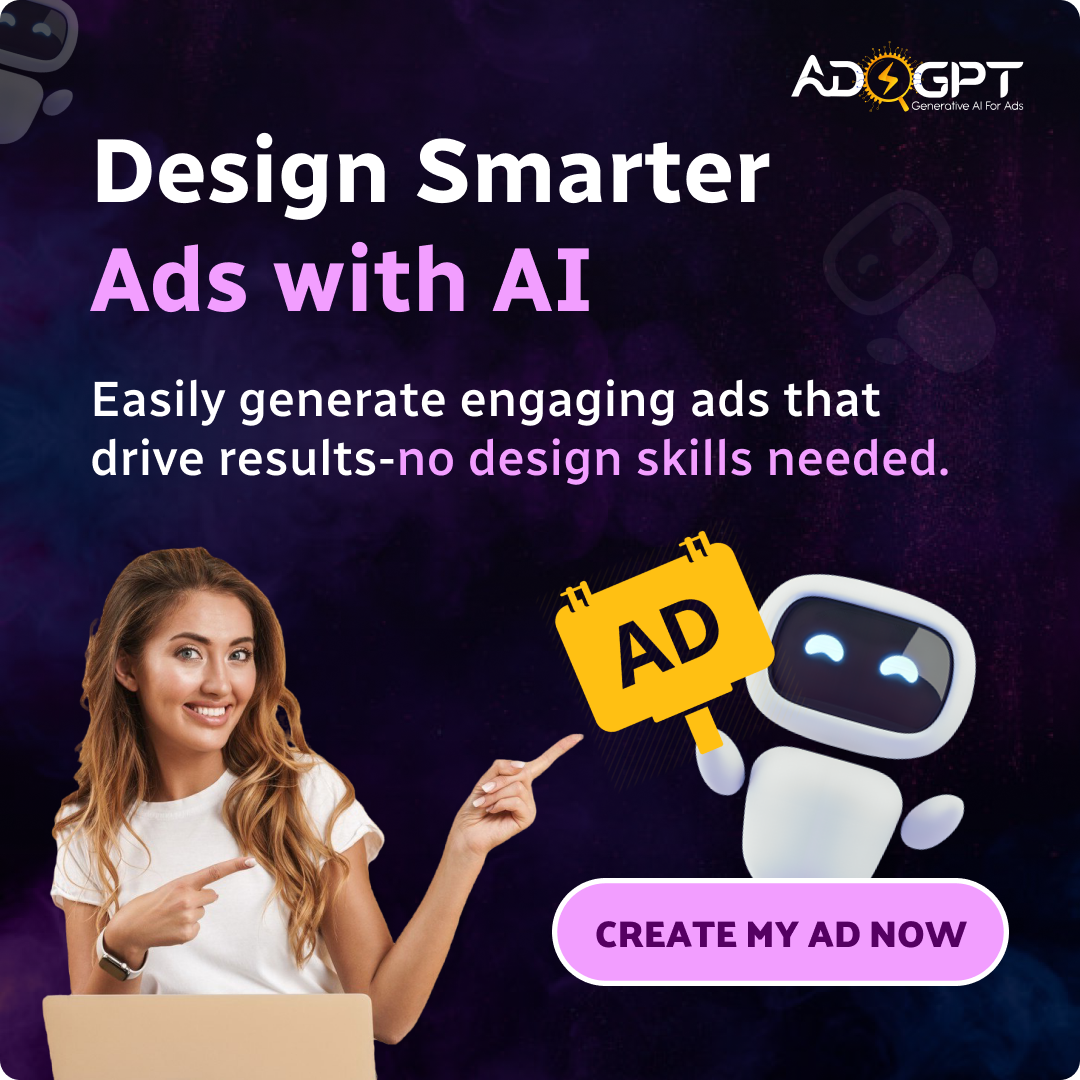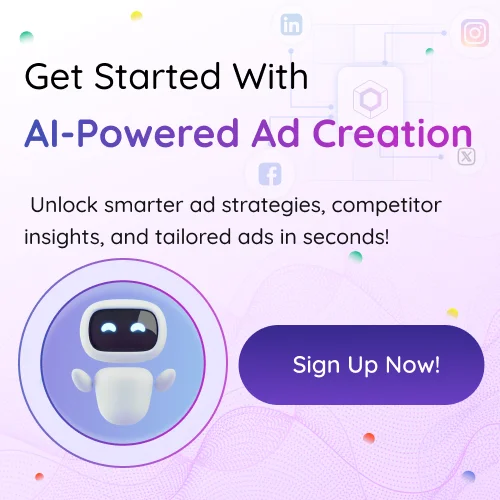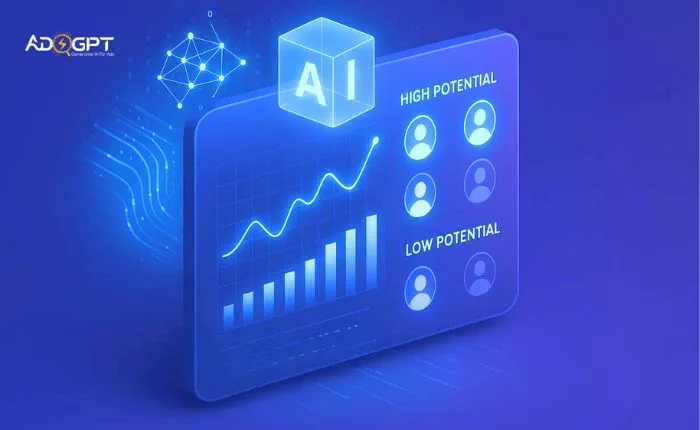
Qualifying leads has always been one of the biggest challenges for sales and marketing teams. You might get hundreds of leads every week, but not every lead is ready to buy. Traditionally, businesses have relied on manual methods or simple point systems to decide which leads are worth pursuing. While these methods work to some extent, they often miss valuable opportunities and waste time on low-quality prospects. This is where AI lead scoring steps in.
By using artificial intelligence, companies can analyze customer behavior, past interactions, and large sets of data to identify high-potential leads faster and more accurately. Unlike traditional approaches, AI doesn’t just rely on guessing; it learns, adapts, and improves over time, giving businesses a smarter way to prioritize leads.
In this blog, we’ll explore what AI lead scoring is, how it works, and why it’s a game-changer for modern businesses. You’ll also discover practical benefits and real-world examples, and the role of tools like AdsGpt in making your marketing and sales campaigns more effective.
What Is AI Lead Scoring?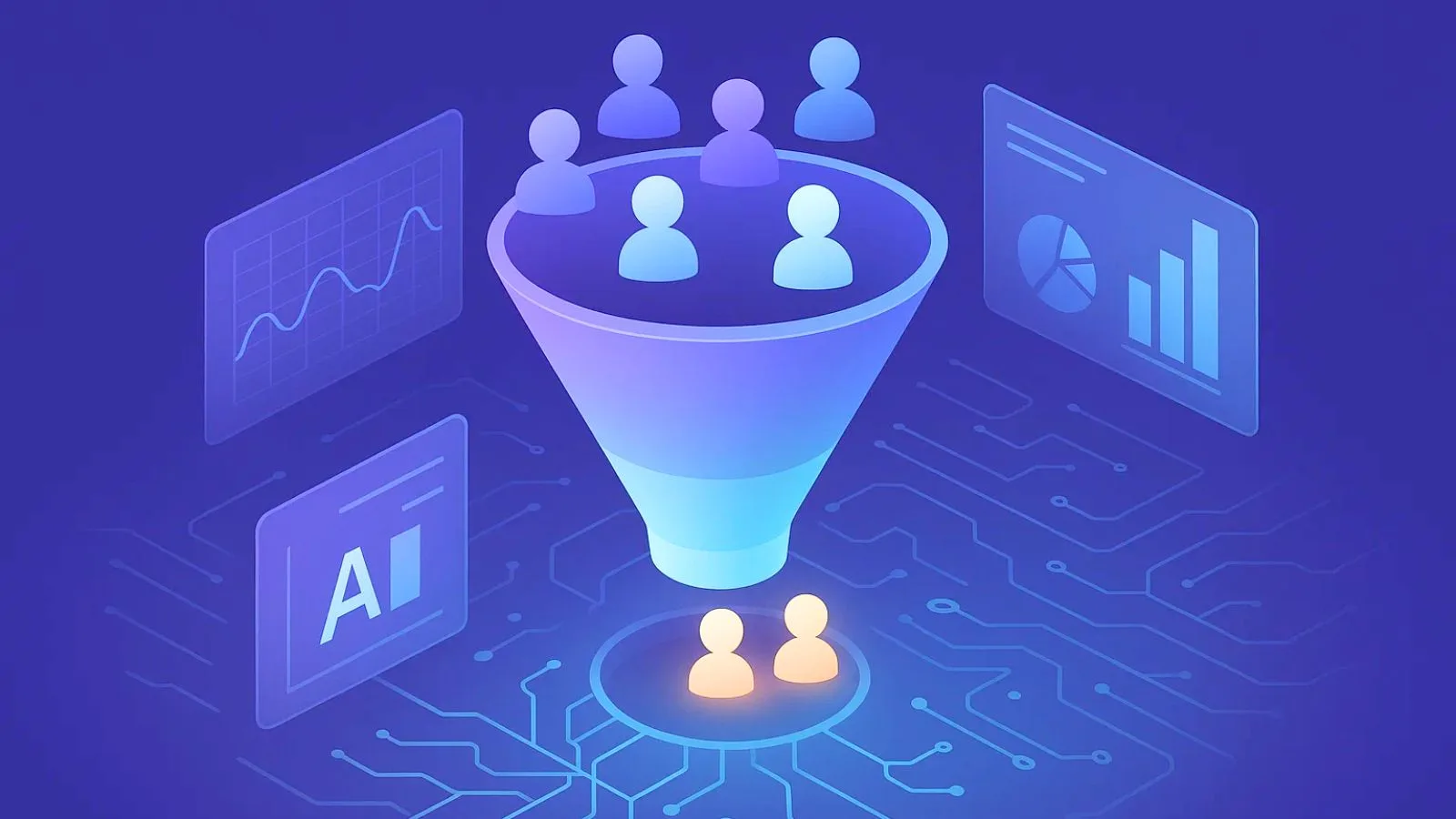
Lead scoring is a way to rank prospects based on their likelihood of becoming customers. Traditionally, businesses use fixed rules, like giving points for actions such as opening an email, visiting a website, or downloading a whitepaper. While useful, this manual approach is often limited because it treats every lead the same and doesn’t adapt as customer behavior changes.
AI lead scoring, on the other hand, uses artificial intelligence and machine learning to analyze large volumes of data and predict which leads are most likely to convert. It doesn’t just assign points based on a checklist; it learns patterns, understands behaviors, and adapts automatically to new trends. With AI scoring, businesses can spot high-value prospects quickly and avoid wasting time on leads that are unlikely to buy.
Compared to traditional methods, AI-driven systems take into account a wider range of factors like browsing history, past purchases, engagement with ads, social media activity, and even subtle signals that humans might overlook. This makes lead scoring AI a far more accurate, data-driven solution for prioritizing leads and boosting conversions.
Why Businesses Need AI Lead Scoring?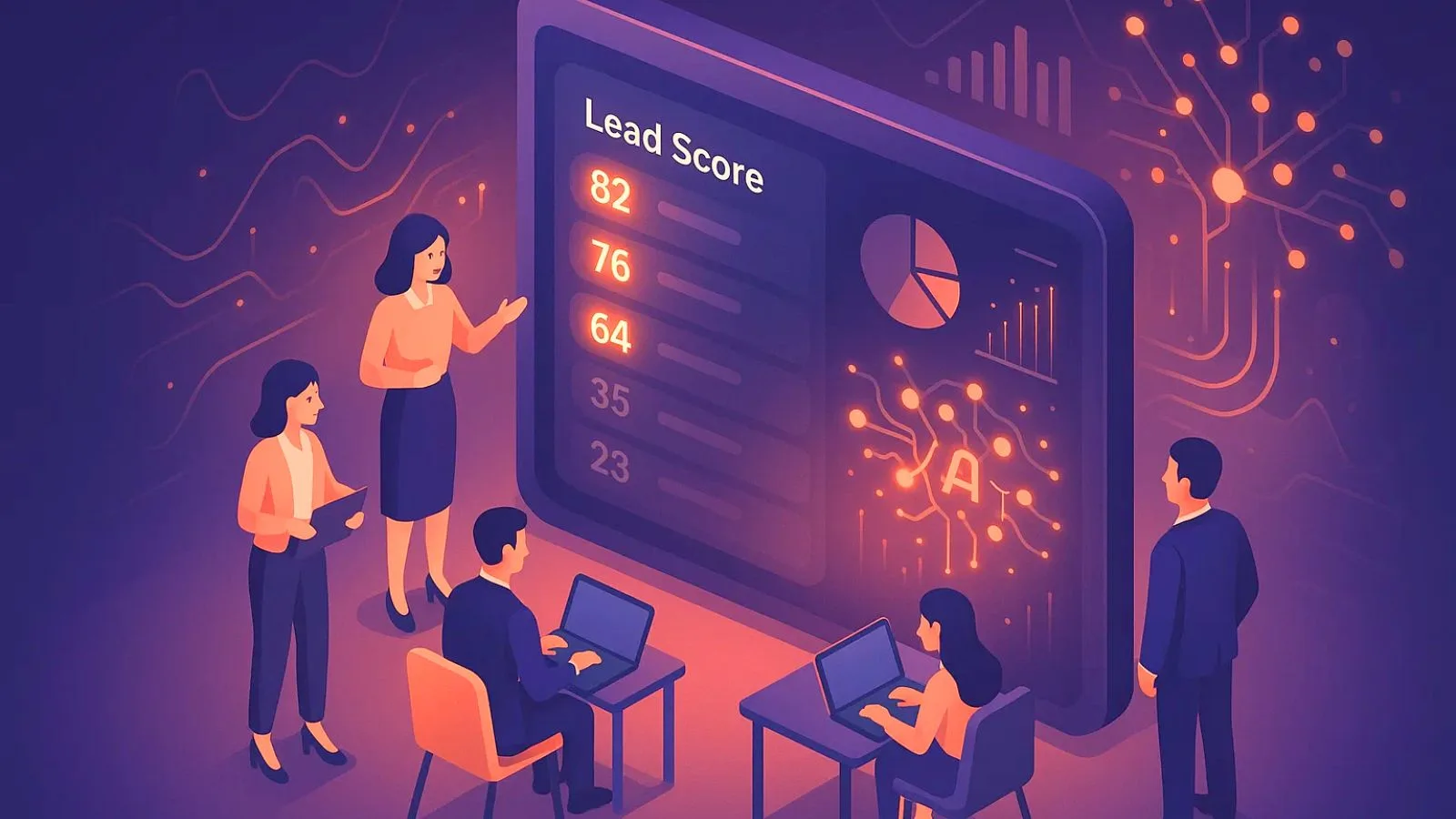
For many businesses, one of the biggest struggles is figuring out which leads are worth the team’s time and effort. Sales reps often spend hours chasing prospects who show little to no intent, while high-potential leads slip through the cracks. This is not just inefficient; it directly impacts revenue growth.
AI lead scoring helps solve this problem by giving businesses a smarter way to qualify leads. Instead of relying on guessing, AI evaluates data from multiple sources and highlights the prospects most likely to convert. This allows sales teams to focus their energy on the right opportunities while leaving low-priority leads for nurturing campaigns.
Here are some key reasons why companies are turning to lead scoring AI:
- Accuracy: AI considers more variables than traditional methods, leading to better predictions.
- Efficiency: Sales and marketing teams save time by working with high-quality leads.
- Personalization: AI tailors the scoring process to each business, adapting to unique customer journeys.
- Scalability: As the number of leads grows, AI can handle the workload without slowing down.
A competitive market, relying on outdated systems, is no longer enough. Businesses need the power of AI scoring to make faster, smarter, and more profitable decisions.
How AI Lead Scoring Works?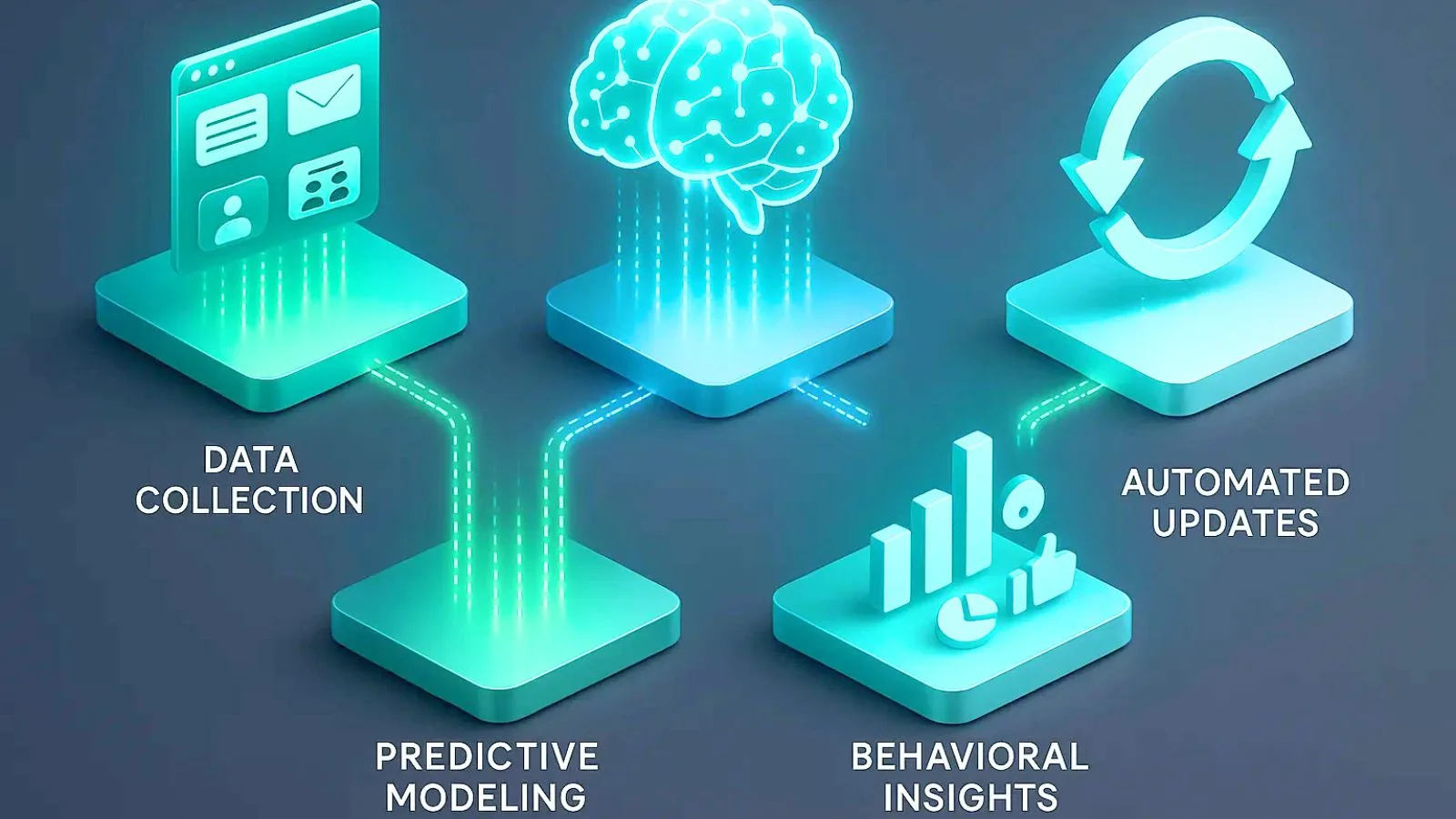
The real strength of AI lead scoring lies in how it processes data and continuously learns to improve results. Instead of assigning points based on rigid rules, AI systems use advanced algorithms to analyze patterns, predict outcomes, and prioritize leads with the highest potential. Follow these simple steps to see how it works.
- Data Collection
AI gathers information from multiple sources, such as website visits, email engagement, social media activity, CRM data, and even ad interactions. The more data collected, the more accurate the scoring becomes. - Predictive Modeling
Using predictive lead scoring, AI builds models based on historical data to identify traits and behaviors that successful leads share. For example, if most customers who buy from you visit your pricing page twice, the model will recognize this as a strong conversion signal. - Behavioral Insights
Unlike traditional methods, AI doesn’t just look at static actions. It also analyzes patterns such as time spent on specific pages, repeat visits, and engagement with campaigns. This provides a deeper understanding of buyer intent. - Automated Updates
One of the biggest advantages of lead scoring AI is that it learns and adapts automatically. As new data becomes available, the system updates its scoring models, ensuring that your lead prioritization is always accurate and up to date.
In short, AI scoring combines big data, machine learning, and predictive analytics to streamline the sales process. This enables businesses to act more quickly, minimize wasted efforts, and close deals with greater confidence.
Key Benefits Of AI Lead Scoring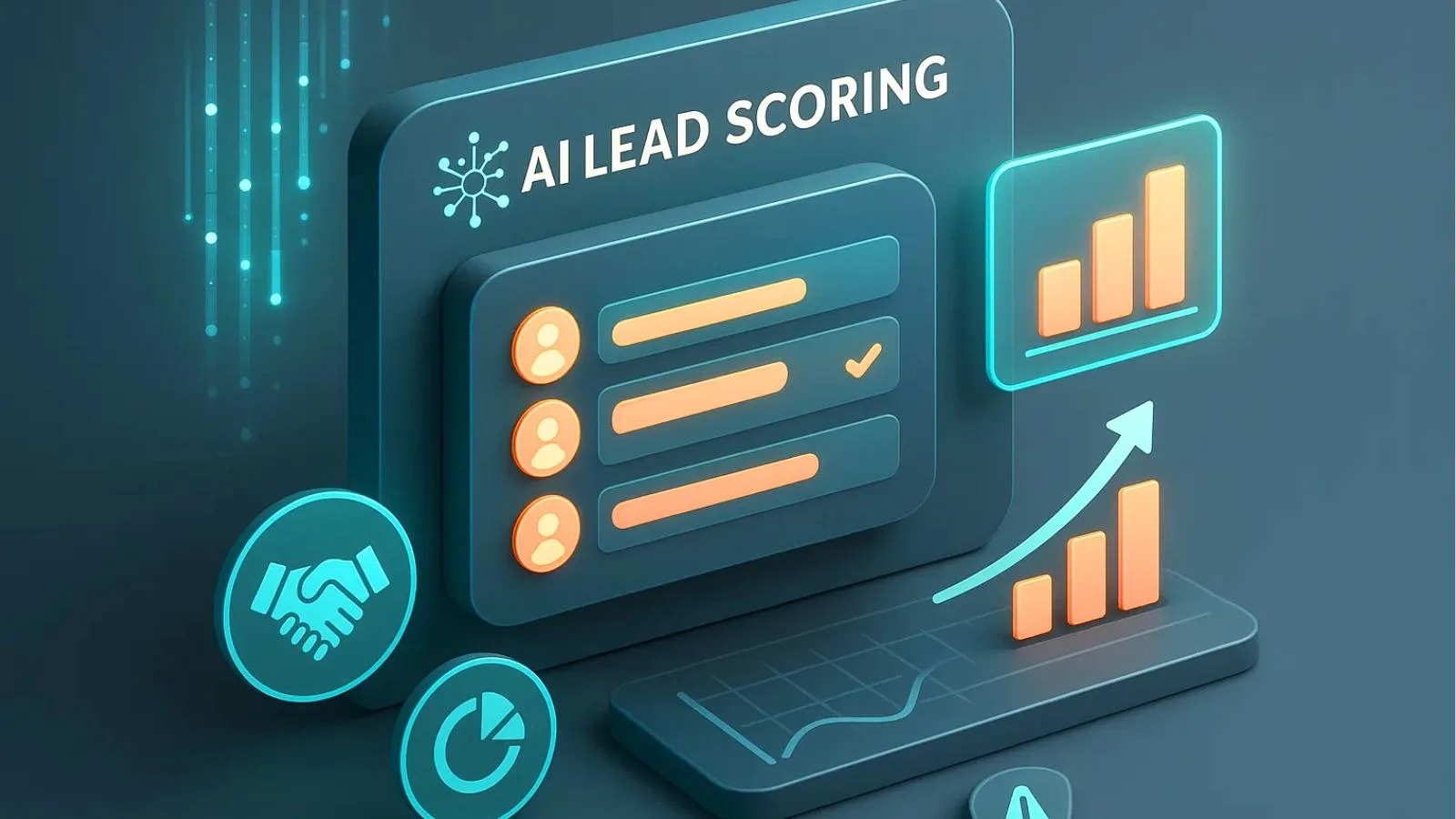
AI lead scoring gives businesses a competitive edge by making sales more efficient and precise. Instead of wasting resources, teams can focus on the right prospects at the right time.
- Faster Lead Qualification – AI quickly spots high-value leads, helping sales reps act before competitors.
- Better Sales-Marketing Alignment – Accurate scoring delivers quality leads and smoother collaboration.
- Higher Conversion Rates – Prioritizing strong leads means more closed deals and better ROI.
- Smarter Campaigns – AI reveals behaviors that signal intent, guiding more effective strategies.
- Fewer Errors – Data-driven scoring reduces bias and missed opportunities.
Overall, AI lead scoring saves time, improves accuracy, and transforms lead management for growth and profitability.
AI Lead Scoring vs. Traditional Lead Scoring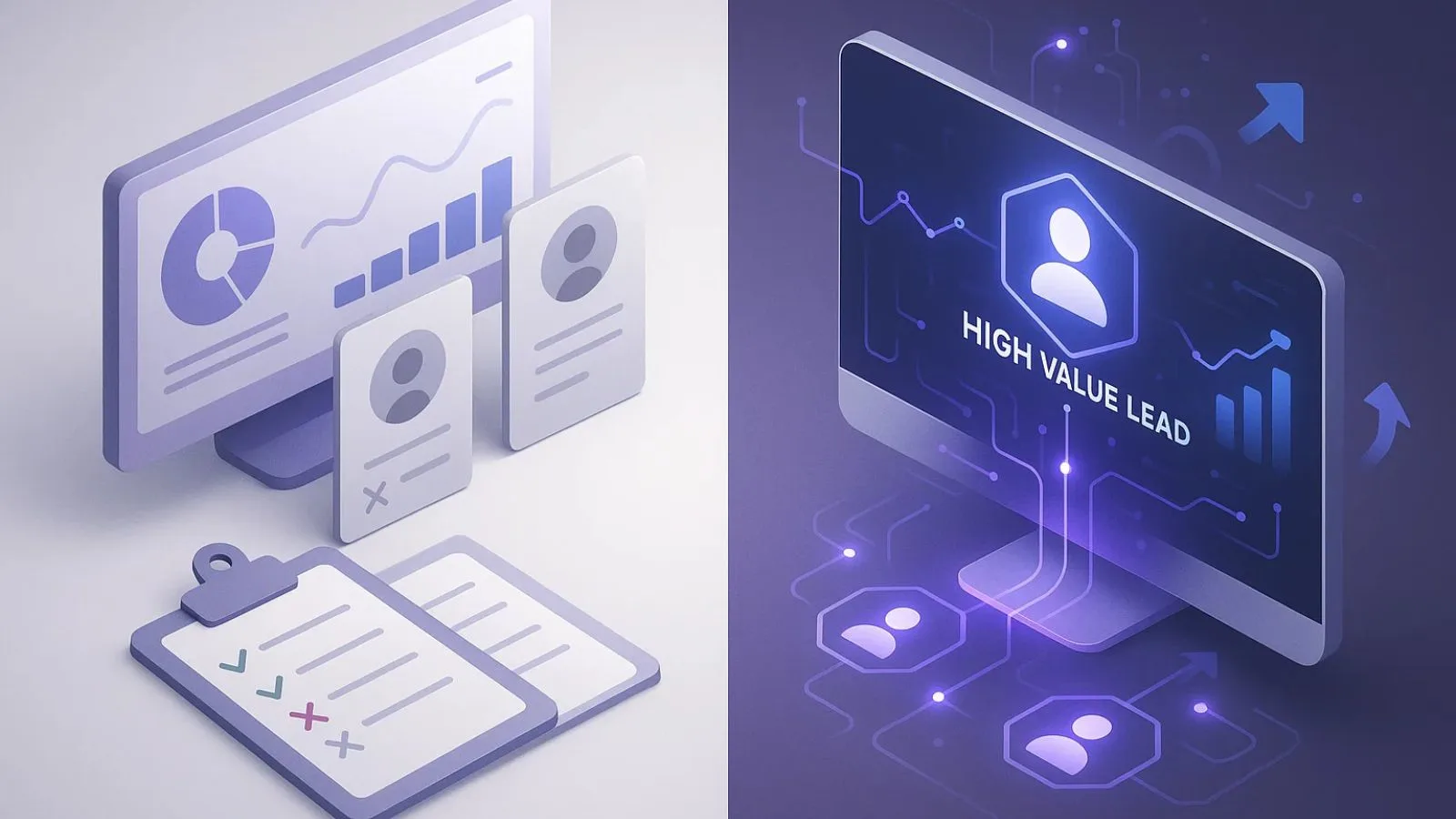
For years, companies have used manual or rule-based methods to qualify leads. While helpful in the past, these approaches are now too limited for today’s fast-paced, data-driven business environment. Let’s look at how AI lead scoring compares to traditional lead scoring:
Traditional Lead Scoring
- Relies on fixed rules, like giving points for email opens, clicks, or downloads.
- Treats all leads with similar actions the same way, ignoring subtle behavioral differences.
- Requires manual updates to scoring models, which can become outdated quickly.
- Often leads to wasted time chasing unqualified prospects.
AI Lead Scoring
- Uses machine learning and advanced algorithms to analyze multiple data points.
- Continuously adapts to changing customer behavior, making it more accurate over time.
- Considers deeper insights like engagement frequency, purchase history, and ad interactions.
- Makes lead prioritization scalable and far more efficient.
Simply put, AI scoring eliminates guesswork. With lead scoring AI, businesses move from a static, rule-based system to a dynamic, data-driven approach that improves lead qualification and conversion rates.
AI Lead Scoring in Action (Use Cases)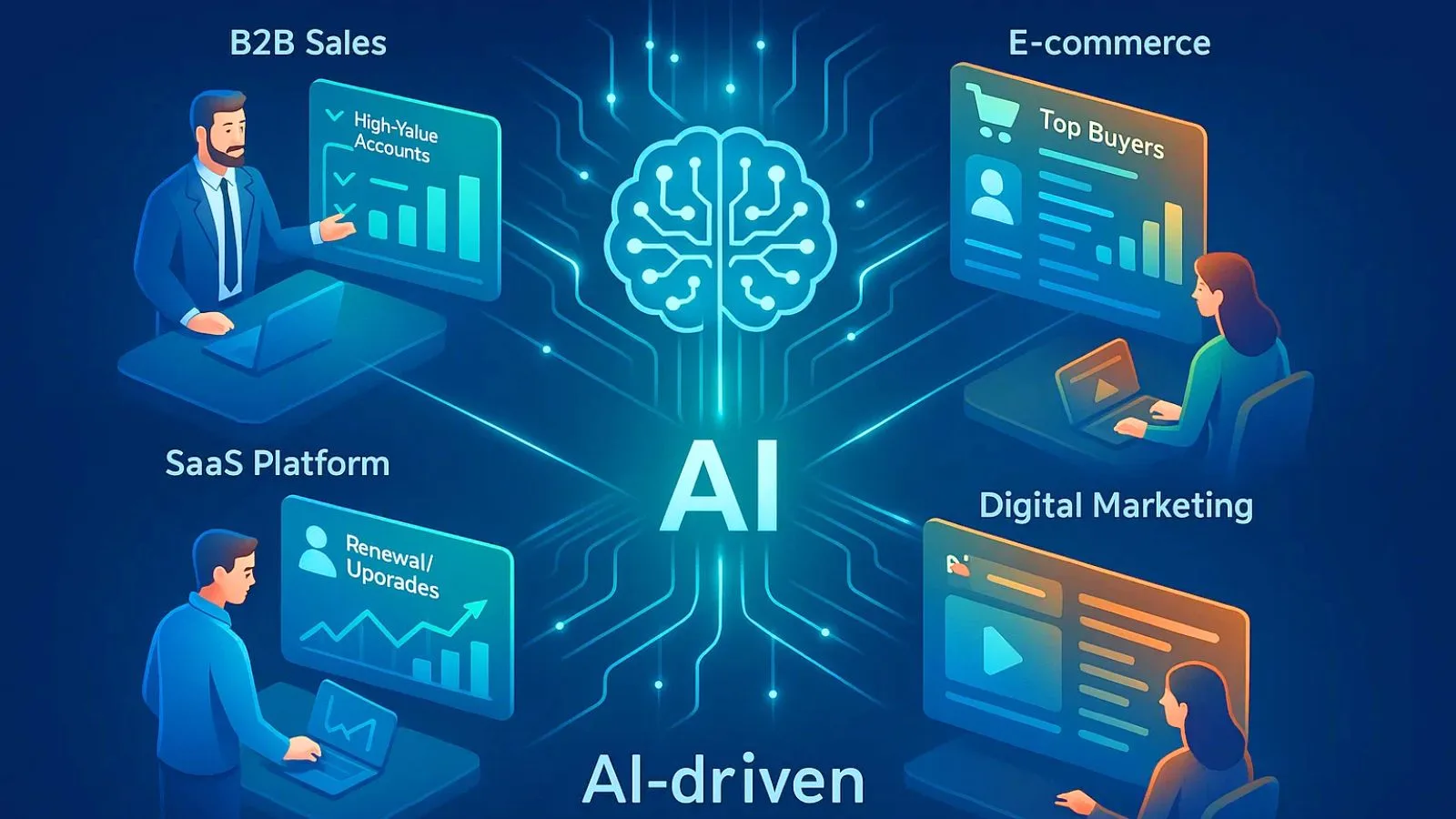
Understanding how AI lead scoring works in real-world scenarios helps businesses see its true value. Here are some practical examples across different industries:
1. B2B Companies
Enterprise businesses often deal with long sales cycles and multiple decision-makers. AI lead scoring helps identify which leads are most likely to close, allowing sales teams to focus on high-value accounts and speed up the deal process.
2. E-Commerce Platforms
Online stores can use AI scoring to predict which visitors are likely to make a purchase or return for repeat orders. By prioritizing these leads, marketers can send targeted promotions and increase conversion rates.
3. SaaS Companies
Subscription-based businesses benefit from AI by predicting which users are most likely to renew or upgrade their plans. Predictive lead scoring helps SaaS companies tailor offers and prevent churn effectively.
4. Marketing and Advertising
AI can also work hand-in-hand with generative AI for ads and AI ad creation. By identifying high-scoring leads, marketers can create personalized ad campaigns that target prospects who are most likely to engage, improving ad performance and ROI.
These examples show that lead scoring AI isn’t limited to one industry — it’s a versatile tool that enhances decision-making, improves efficiency, and drives revenue growth across sectors.
Best Practices for Implementing AI Lead Scoring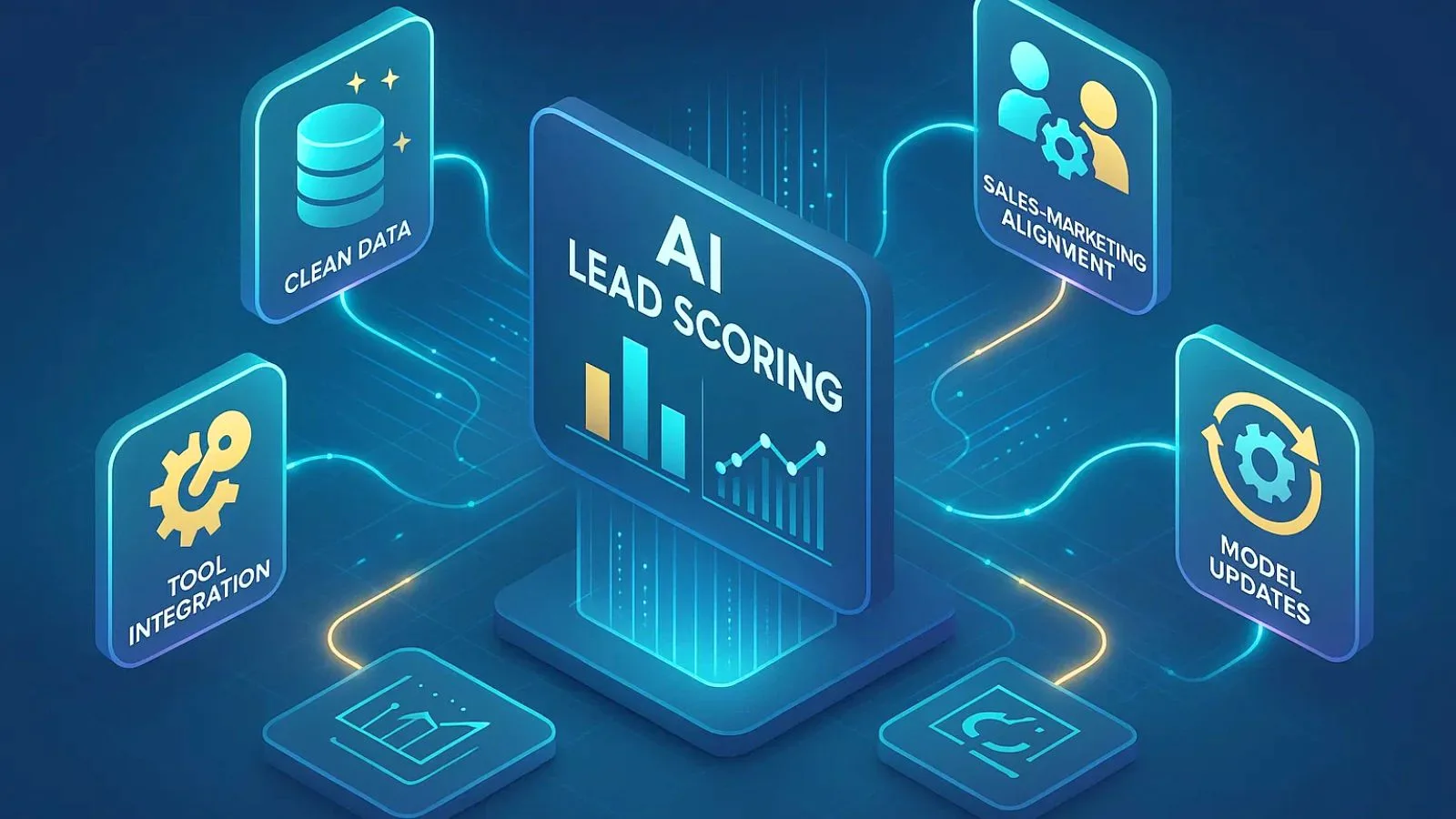
To get the most from AI lead scoring, follow these key practices:
- Use Clean Data – Reliable scores start with accurate, up-to-date CRM and marketing data.
- Align Sales & Marketing – Define qualified leads together so the model reflects shared goals.
- Keep Models Updated – Regularly retrain AI with new behaviors and metrics to stay accurate.
- Integrate Tools – Connect AI with CRM and automation platforms for seamless lead management.
- Monitor & Optimize – Track conversions and refine criteria to maximize ROI.
Done right, AI lead scoring becomes a core strategy that saves time, improves accuracy, and drives more deals.
Supercharge AI Lead Scoring with AdsGpt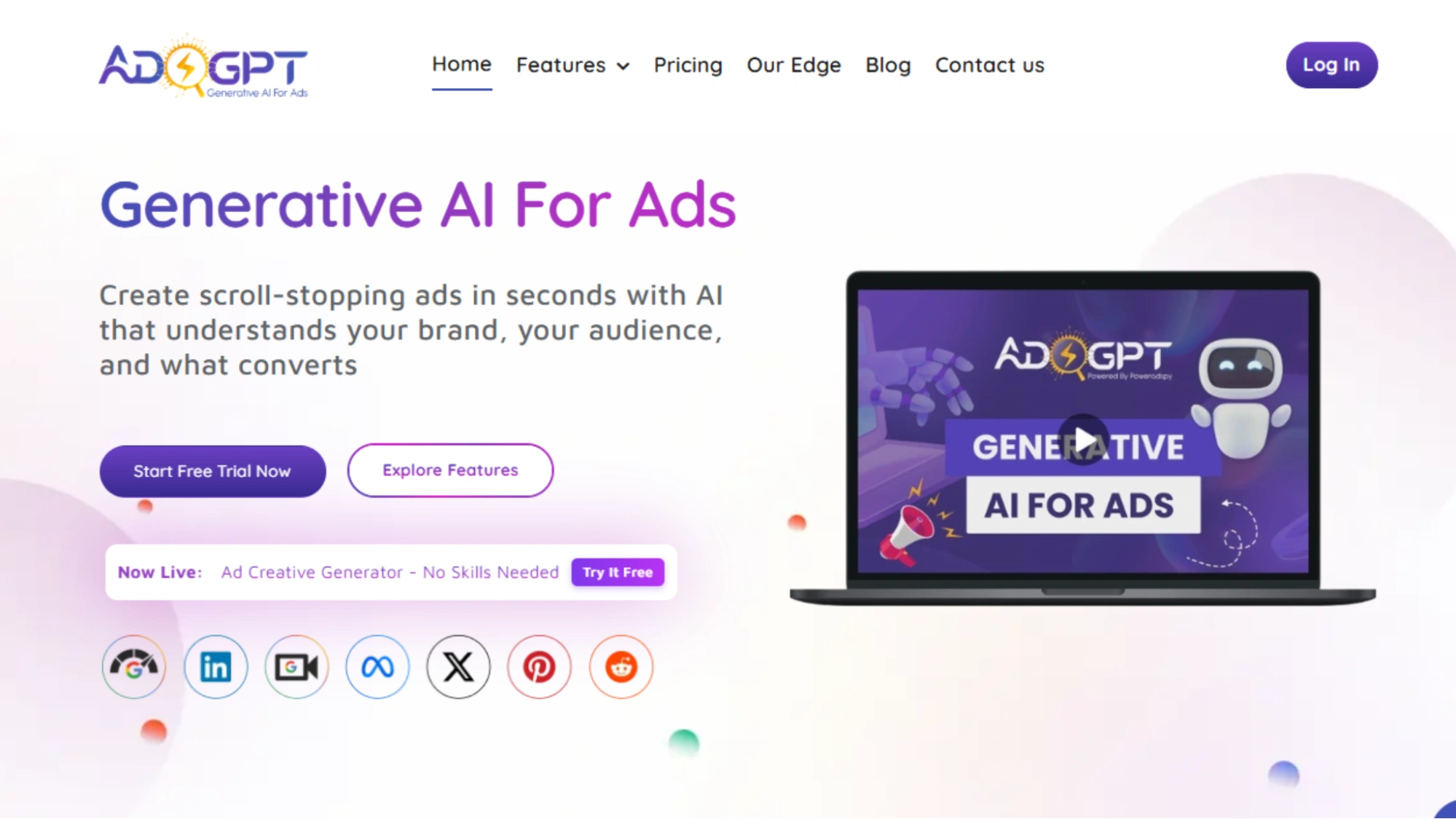
While AI lead scoring helps identify high-potential leads, combining it with the right tools can take your marketing and sales efforts to the next level.
AdsGPT uses AI to simplify ad creation, making it quicker and more effective.
Why AdsGpt Works with AI Lead Scoring?
- AI Ad Creation: Automatically generate ad creatives tailored to high-scoring leads, increasing the chances of engagement and conversions.
- Targeted Campaigns: By leveraging lead scores, AdsGpt ensures that your ads reach the prospects most likely to take action.
- Time-Saving Automation: No need to manually design multiple ad variations. AdsGpt handles it for you, freeing your marketing team to focus on strategy.
- Data-Driven Insights: Gain a deeper understanding of which campaigns resonate with your most valuable leads, allowing for continuous improvement.
By integrating AdsGpt with your lead scoring AI, businesses can not only prioritize the right leads but also engage them with personalized ads that drive results. It’s a powerful combination that streamlines the entire sales funnel from qualification to conversion.
Conclusion
AI lead scoring is transforming the way businesses qualify and prioritize leads. Analyzing data, predicting behavior, and adapting in real time helps sales and marketing teams focus on the prospects that matter most. Integrating tools like AdsGpt makes the process even smarter, combining lead insights with AI-driven ad creation to boost conversions and ROI.
Embracing AI lead scoring means faster decisions, higher accuracy, and more sales, a smarter approach for any business ready to grow.
FAQs
1. How does AI improve lead scoring compared to traditional methods?
AI analyzes large datasets, identifies hidden patterns, and continuously learns from new data, providing more precise and dynamic lead rankings than static manual scoring systems.
2. Can AI lead scoring integrate with existing CRM tools?
Yes. Most AI lead scoring platforms seamlessly integrate with popular CRM systems, allowing sales and marketing teams to view prioritized leads directly within their workflow.
3. Can AI lead scoring work for small businesses, too?


